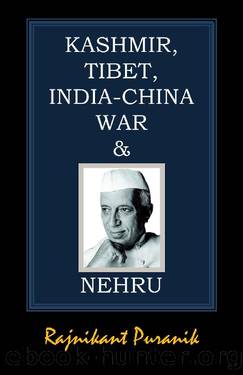Kashmir, Tibet, India-China War & Nehru by Rajnikant Puranik

Author:Rajnikant Puranik [Puranik, Rajnikant]
Language: eng
Format: epub
Published: 2018-08-15T18:30:00+00:00
Independent Indiaâs Indifferent Approach
Given the critical importance of Tibet, India should have exerted its utmost to ensure Tibet retained its independent status. But, did India do so? Did India come to the rescue of its good neighbour, facing extinction as an independent entity? Did India fulfil its obligation as a friend and a neighbour? Did we come good on the trust that our weaker neighbour, Tibet, reposed in us? Did Nehru walk the talk on anti-colonialism and anti-imperialism? Did India try to save its neighbour from being colonised? Did India try to protect its own crucial interests? What role did India play?
What was independent Indiaâs or Nehruâs Tibet policy? None. It was actually a defeatist policyâthrow up your hands and declare there is nothing India can do to save Tibet. While the independent India was an indifferent Indiaâindifferent to its own securityâBritish-India had done all it could to keep Indiaâs northern borders secure by ensuring Tibet remained free from foreign powers.
India was in desperate need of a Patel to drive its strategic thinking. Nehru, by stating on 1 November 1950 in an interview to the Unites Press that âIndia has neither the resources nor the inclination to send armed assistance to Tibetâ{Arpi/374} and that âWe canât save Tibetâ seemed to wash his hands off the whole affair so critical to Indiaâs security, and seemed to suggest that other than armed intervention, which India didnât wish to undertake, there was nothing India could do!
Even if India did not have the military strength to confront and prevent China, there were so many other steps that India could have taken: express disapproval; provide moral support to Tibet; lodge protest in the UN; mobilise world opinion against Chinese action; grant recognition to Tibet as an independent nation; persuade other nations to also do so; demand plebiscite in Tibet to ascertain the opinion of the publicâChina had agreed for a plebiscite in Mongolia, that led to its independence; work towards ensuring complete independence for Tibet through peaceful means. Even if the final favourable outcome took decades it didnât matterâat least there would have been hope.
Had India taken the initiative many nations would have supported India. In fact, many did pass resolution in favour of Tibet in the UN later, which India, the affected country, did not support!
Had India been still British-India in 1950, Britain would certainly have resisted China in Tibet in some way or the other and would have ensured Tibet remained free from China.
One could argue that doing so would have made China an enemy of India? Well, if China were to attack Bhutan or Burma or some other country tomorrow, should India keep quiet lest it should cost us Chinaâs friendship? Did China care for our friendship when it attacked our friend and neighbour Tibet? Are friendships only one-sided? And, even if friendship with China was broken because of our moral support to Tibet and China had become our enemy, so what? If it suited China to act against us, it would have found a reason for doing so, friendship or no friendship, like it did later.
Download
This site does not store any files on its server. We only index and link to content provided by other sites. Please contact the content providers to delete copyright contents if any and email us, we'll remove relevant links or contents immediately.
| Central Asia | Southeast Asia |
| China | Hong Kong |
| India | Japan |
| Korea | Pakistan |
| Philippines | Russia |
The Sympathizer by Viet Thanh Nguyen(4384)
The Rape of Nanking by Iris Chang(4203)
World without end by Ken Follett(3474)
Ants Among Elephants by Sujatha Gidla(3460)
Blood and Sand by Alex Von Tunzelmann(3195)
Japanese Design by Patricia J. Graham(3167)
The Queen of Nothing by Holly Black(2586)
City of Djinns: a year in Delhi by William Dalrymple(2549)
Foreign Devils on the Silk Road: The Search for the Lost Treasures of Central Asia by Peter Hopkirk(2455)
India's Ancient Past by R.S. Sharma(2450)
Inglorious Empire by Shashi Tharoor(2437)
Tokyo by Rob Goss(2427)
In Order to Live: A North Korean Girl's Journey to Freedom by Yeonmi Park(2378)
Tokyo Geek's Guide: Manga, Anime, Gaming, Cosplay, Toys, Idols & More - The Ultimate Guide to Japan's Otaku Culture by Simone Gianni(2360)
India's biggest cover-up by Dhar Anuj(2350)
The Great Game: On Secret Service in High Asia by Peter Hopkirk(2332)
Goodbye Madame Butterfly(2250)
Batik by Rudolf Smend(2179)
Living Silence in Burma by Christina Fink(2066)
